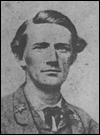
|
|
John Singleton Mosby "The Gray Ghost" |
If the Confederate States of America gave rise to a single bogeyman, it would have to have been Colonel John Singleton Mosby, a partisan ranger operating in northern Virginia who was possibly, in the opinion of his biographer James Ramage, "the single-most-hated Confederate in the North." Mosby set for himself the formidable task of harassing the Federal troops who surrounded Washington, DC, and so threatening the capital that President Abraham Lincoln would not feel safe detaching any of them to assist his field generals in their campaign against Robert E. Lee and the Army of Northern Virginia.
The success of Mosby and his guerilla campaign was such that the mere mention of his name filled Union hearts with dread. Mosby's uncanny ability to appear and disappear seemingly at will earned for him the nickname "The Gray Ghost" and ensured that his exploits would be remembered well into the 20th century. A popular television series produced in Hollywood in the 1950's and entitled "The Gray Ghost" portrayed Mosby as a dashing, romantic hero -- a view with which Southerners of the mid-1860s would surely have agreed -- and made him the only figure from either army to rate his own TV show.
In 1995, the area where Mosby and his men held sway -- which includes parts of Loudoun, Clarke, Warren, Fauquier, and Prince William Counties, the towns of Middleburg, Leesburg, Front Royal, Berryville, and Haymarket, and the Manassas National Battlefield Park -- was designated as the John Singleton Mosby Heritage Area (http://www.mosbyheritagearea.org/). It was here that poet Herman Melville, a non-combatant during the War Between the States, joined in an expedition headed by his friend and fellow poet James Russell Lowell, commander of the 2nd Massachusetts Cavalry, to seek out and neutralize Mosby and his partisan rangers.
Although not a completely factual accounting of the trip, the lengthy poem does refer to a number of incidents to which Melville was witness. Its real value lies in its accurate portrayal of the fear that Mosby and his men inspired in the soldiers whose job it was to pursue and capture them and the awe in which they were held by the citizens of thoroughly Confederate Virginia. Perhaps the only other Confederate officer to achieve such a degree of notoriety was Kentuckian John Hunt Morgan, whose exploits are recounted in the poem "Kentucky Belle."

"The Scout Toward Aldie"